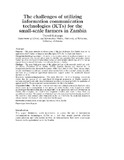The challenges of utilizing information communication technologies (ICTs) for the small-scale farmers in Zambia

View/
Date
2005Author
Kalusopa, T.
Publisher
EmeraldType
Published ArticleMetadata
Show full item recordAbstract
Purpose – This paper attempts to discuss some of the key challenges that Zambia faces in the
application of information communication technologies (ICTs) for the small-scale farmers.
Design/methodology/ approach, A survey of information needs of small-scale farmers in two
selected provinces was carried out in order to establish and prioritize their information needs. Evaluation of the existing information infrastructure provided insights into the type of ICTs that can
support the provision of information to small-scale farmers in Zambia. Findings - The paper highlights some of the salient findings of the research carried out under the African Technology Policy Studies (ATPS), Zambian Chapter and financed by the
International Development Research Foundation (IDRC) from 2001 to 2003. These, among others, include: weak human capital and technical infrastructure, lack of clear national information policy
and lack of a coordinated agricultural information support system for small-scale farmers
anchored on ICTs.
Research limitations/implications – This study illustrates that it is becoming increasingly
evident that the success of any agricultural development programme in Zambia requires a well organized and functionally integrated information delivery system propelled by the application of
appropriate ICTs. The paper presents recommendations for this to be realized.
Originality/value – The changes in the socio-economic and political arena in Zambia have had a
drastic effect on the management of the agriculture sector. Further, even though it is widely
acknowledged that information plays an important role in agricultural and rural development in
Zambia, this conception has received less pragmatic attention and seems to have been less
consolidated over time. The central role of information in this sector has thus been largely superficial. The need for a clear national policy framework on the use of ICTs for the small-scale farmers to enhance national development is thus articulated in this paper.
